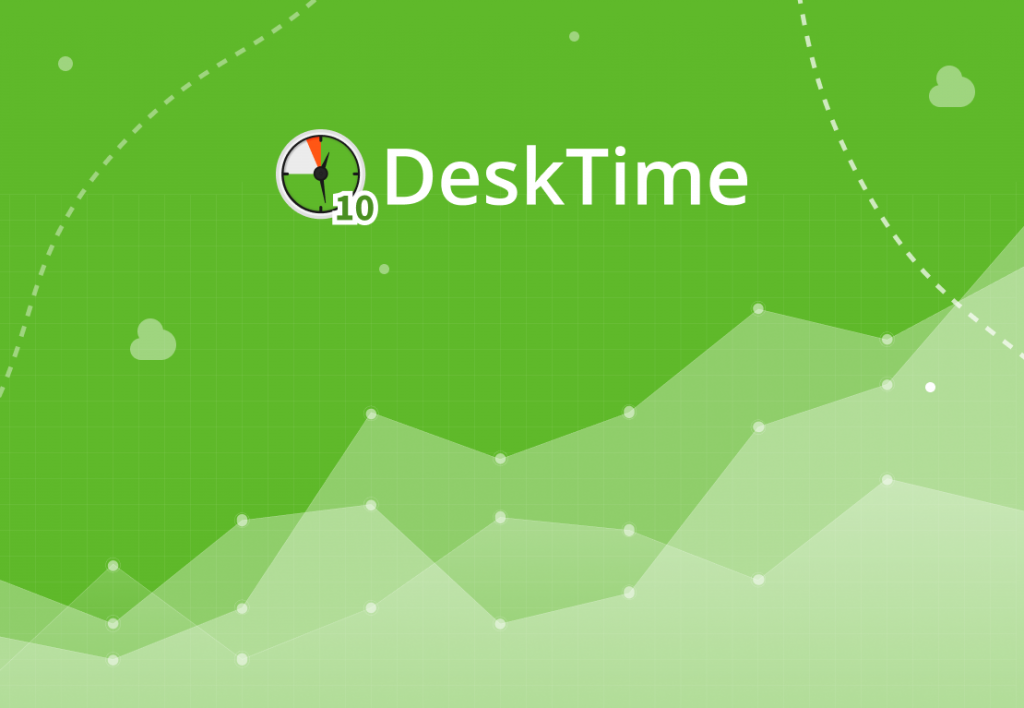10 lessons learned from 10 years of DeskTime

DeskTime is turning 10 this year.
It feels like just yesterday the idea of a fuss-free, automatic time tracking tool was born, and a few months later it’s turning 10 years old. Time really does fly when you love what you do.
10 years is a long time. That’s 87600 hours full of challenges, wins, and failures, and lessons learned. So today, I’ll share some of them – 10 of the biggest lessons learned from 10 years of DeskTime, by me, CEO of DeskTime.
Want to get the most out of your time?
Try DeskTime for free!
Try free for 14 days · No credit card required.
By signing up, you agree to our terms and privacy policy.

Ready or not, here they come:
1. Scratch your own itch
The idea of ”scratching your own itch” is simple: you identify a problem or challenge you have internally at your current business or a company you work for, then find a way to solve it. That’s exactly how the idea of DeskTime was born.
DeskTime was created as an in-house solution by the founders of Draugiem Group. Already back in 2011, before it became a worldwide trend, the company was an advocate for flexible working hours and allowed their employees to arrive at work until 11am. While everyone loved the flexibility, it posed a challenge to the management – because people came and left at different times, it was difficult to ensure transparency and make sure everyone was putting in 8 hours of work a day.
The existing solutions on the market were either too complex or required people to manually switch the timer on and off. That’s when they came up with the idea of DeskTime – a simple, easy-to-use automatic time tracker.
Soon after, the founders realized there are other teams that had the same itch they did, and decided to release DeskTime for other companies, solopreneurs, and freelancers to use.
2. Your product is never finished
No matter what you’re building, it’s never going to be finished. As soon as you add an update or new feature, there’s always going to be another one around the corner, waiting to be developed.
Over the course of 10 years, DeskTime has experienced 2 grand design changes and countless brush-ups. We’ve added 14 new features and 8 integrations with other apps. We constantly look for more ways to improve our user experience, we listen to the needs of our customers and adjust the product to suit the new and evolving workplace habits.
When it comes to updates and new features, our wishlist never comes even close to an end. New ideas keep coming in from our team members, as well as our customers. A few years ago we even launched ”Feature requests” that allow our users to suggest ideas for new features and vote for other users’ ideas.
To date, we’ve received hundreds of ideas and new ones are coming in every day, and that’s what motivates us – as long as there’s room for improvement, there’s room for growth.
3. No business is built without failures
Let me start by saying that we don’t glorify failures. We’d be happy if we had never failed on our journey, and all our decisions had been correct and well-thought-out. But they haven’t.
For example, back in 2014, the team was working on a DeskTime update, which ended up being more time-consuming than we anticipated. We thought that it was a good idea to put all our human and financial resources into finishing the new and improved version, putting things like marketing and advertising aside.
That was actually the worst idea.
Because of this inefficient resource management and some bad decisions, the business stopped growing. We ended up struggling for the next few years until 2017 when we finally got back on the growth path.
We learned our lesson from this mistake, just as we learn lessons from all our other failures, and try not to make the same mistakes again.
4. The value of time changes in times of crisis
One thing that I’ve noticed over the years is that companies start to value their time more in times of crisis – be it something that affects one specific company, or something global like the Covid-19 pandemic.
When the Covid-19 pandemic struck and companies were forced to switch to remote work, you could feel society’s confusion. People were not prepared for it – neither business owners and managers nor employees.
There were so many questions. How do you make sure your company’s time is spent productively? How do you know that time is not wasted when your business is suffering from lockdown and struggling to make ends meet? I believe that these and similar questions are the main reason DeskTime experienced its growth in 2020 when its turnover increased by +160%.
DeskTime has always existed to help companies find answers to these questions, and the Covid pandemic highlighted the importance of knowing answers to these questions. In the long run, we hope DeskTime also helped businesses improve transparency and fostered greater mutual trust between employees and employers, which will allow companies to continue to offer remote work options when the pandemic is finally over.
5. You don’t need to hire in-house when you can outsource
In 2011 DeskTime was created and launched by a 2-people team, and all these years we’ve purposely kept our team small. Even in 2020, when the business experienced its growth spurt, we decided to stay lean and, instead of hiring tens of people to satisfy the growing needs of the company, we chose to outsource the skills we needed.
I’m a strong believer that you don’t need full-time employees during the first stages of your business. And even when your company has reached the stage where it’s stable and growing, outsourcing can still be the best option.
For all the 10 years of DeskTime, outsourcing professionals of their respective fields has been one of the best decisions we’ve made and the key to our success. This has allowed us to stay in control of our expenses through the ups and downs of the business, while continuously collaborating with some of the best professionals out there.
6. You should always put your team first
Our team might not be big, but it’s the best. I highly value and appreciate every single person who works for DeskTime and I’m extremely lucky to be their CEO.
As I mentioned, DeskTime is part of the Draugiem Group – an EU-based startup hub, where employee wellbeing has always been of the utmost importance. Our philosophy is that if you take good care of your employees, they’ll stick around and take good care of your business.
We’ve offered flexible working hours from day one, as well as free lunch and a paid day off for any health-related reason, including mental health and burnout. During the pandemic, the time that has been difficult for all of us, so we also introduced 10 paid therapy sessions for all our team members. Yes, those are all extra costs for the company, but it’s 100% worth it.
Over the years, our team has become like a family. We celebrate our biggest successes and milestones together with our employees and their families, including kids. And our 10-year anniversary won’t be an exception.

Want your business to thrive?
Boost your team’s productivity and efficiency ratings with time tracking!
7. We should all take our time more seriously
In one interview, Bill Gates said that time is the only thing that money cannot buy. As a billionaire who can buy anything he wants, more time is the only thing he can’t. Thus, he plans his time very carefully, making sure each minute is used well.
The problem I see a lot is that modern office workers don’t take their time seriously enough. A lot of time is still wasted, and people try to compensate for it by working overtime, which is neither productive nor healthy, as one of our studies shows.
For this reason, DeskTime is strongly against overtime. We encourage our employees to use time tracking to make sure they spend their time productively so that no overtime is necessary. If someone is struggling and regularly works overtime, this issue needs to be addressed – maybe this team member simply can’t handle his/her workload and needs help.
8. If you won’t take breaks, you’ll break
Another thing we advocate for is breaks.
Back in 2014, a DeskTime study showed that the most productive people aren’t those who work the most hours, but those who take regular breaks. That reminded us of something we already knew – people aren’t meant to work 8 hours non-stop. We’re not machines. Our brains need breaks, and our bodies need time to relax, too.
Not only do we encourage our team members to have time off screens and relax, but we also encourage our users to do the same. We’ve published several articles that talk about the importance of work pauses, and in 2018, we introduced the Pomodoro time tracking feature that reminds DeskTime users to take a break every 52, 60 or 90 minutes.
Even a quick 5-minutes break can go a long way in improving your wellbeing and performance. Research shows that regularly detaching from your work tasks can help restore energy in the short term and prevent burnout in the long term.
9. Being helpful yields better results than advertising
All these years DeskTime has been in business, it’s existed with one purpose: to help individuals, teams, and organizations become more productive and effective. And everything we do, we do it with this goal in mind.
In 2012, we created DeskTime’s blog to talk about office work organization, employee wellbeing, and other important aspects of workplace productivity. In 2019, we re-launched DeskTime’s YouTube channel where we now publish a new video every week, covering a variety of topics, including team management, hybrid work, and personal productivity.
We also regularly test the latest workplace productivity trends to see what really works and what is just a buzz. Our team has experimented with giving up coffee, working while sitting on a yoga ball, blocking Facebook on desktop, to name a few – just to help you find the best way to be productive.
What I’m saying is, being helpful goes a long way. It works better than any advertising. And every time someone suggests DeskTime to a friend because we’ve helped them become more productive, we once again make sure that we’ve chosen the right approach.
10. Always set higher goals than you feel comfortable with
I agree with Larry Page, one of the co-founders of Google, who said: ”It’s very hard to fail completely if you aim high enough.” Here at DeskTime, we’re not afraid to set big goals, even if at first they seem out of reach. Because even if we only get halfway, that will already be a success.
For example, we’ve now set ourselves a goal of reaching a 50% increase in annual turnover. We’re also working on increasing our revenue 4 times by 2023. These goals are ambitious and definitely out of our comfort zone, but we’re up for the challenge!
Here’s to the next 10 years of DeskTime! Thanks for being with us!
Did you find this article useful? Give it a clap!
Psst! You can clap more than once if you really loved it 🙂